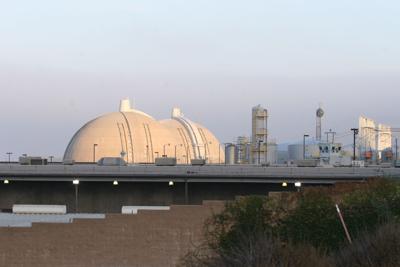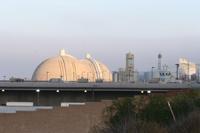
San Onofre Nuclear Generating Station. Photo: Andrea Swayne
By Jim Shilander
A panel of experts on the state of storage of nuclear waste in the United States admitted Tuesday at a San Onofre Nuclear Generating Station Community Engagement Panel at the San Juan Capistrano Community Center that on a national level, there was a significant lack of urgency about the issue of spent nuclear fuel and how best to dispose of it.
The CEP and panelists from the Bipartisan Policy Commission’s nuclear waste program were brought together to get an assessment of just what could be done about spent nuclear fuel, such as that stored at SONGS.
Geoff Fettus, an attorney for the National Resources Defense Council said the solution, moving beyond Yucca Mountain, is providing a legal framework for states to have meaningful regulatory authority over waste, to go along with giving states consent over whether a repository could be placed within it.
David Wright, a former member of the South Carolina Public Service Commission, said any interim storage solution would likely require a “bottom-up” approach, where communities agitated for the right to store fuel as a potential economic boost.
San Clemente City Councilman Tim Brown said he worried that an interim solution, such as storing fuel on the site of plants, could become a permanent one.
Other potential solutions suggested were efforts at a second, or additional repositories, or for casks to be taken from decommissioned sites to operating plants.
On a panel about regional solutions, panelists noted it is important for localities looking to get rid of waste to consider not just the effect on the final destination but the “corridor” communities it would pass through. Chris Thompson, Southern California Edison’s Vice President for Decommissioning, noted that the utility had worked with others for the creation of a private repository for storage in Utah, on tribal land, but the effort was blocked by the state.
Marni Magda, an activist who participated in the panel, said the effort should be made statewide to take waste from plants to the desert, ideally to a military base, where it could be protected.


